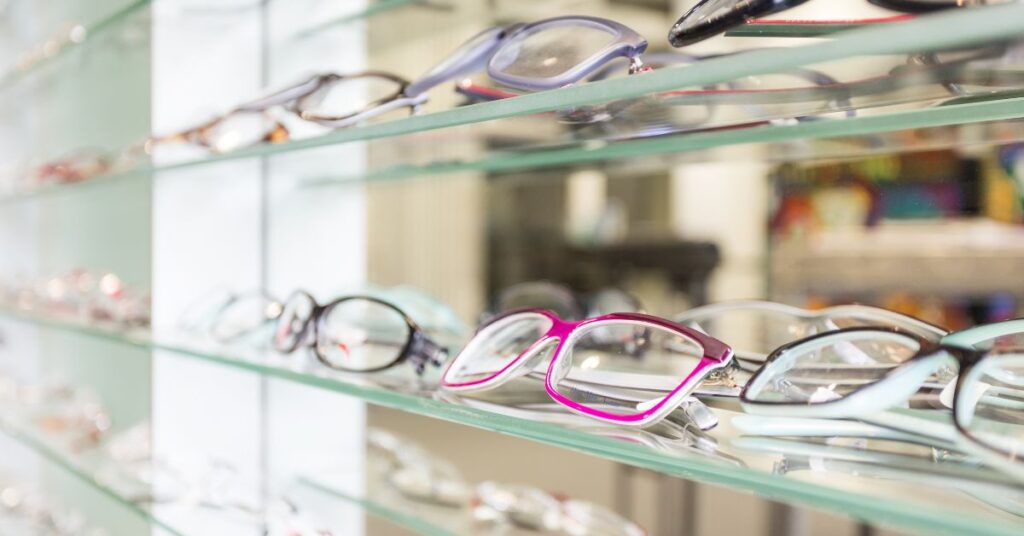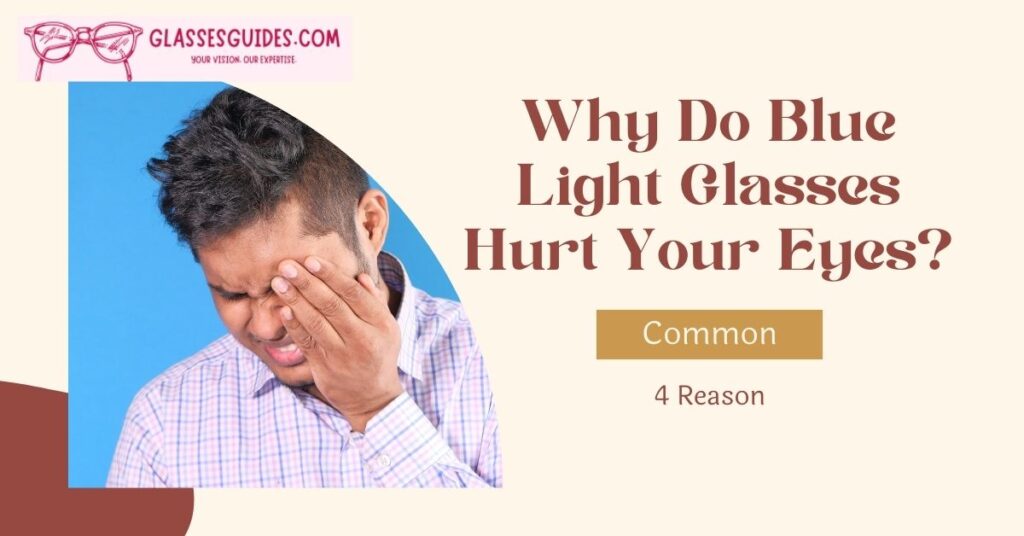If you have been experiencing eye discomfort when wearing blue light glasses, you are not alone. While these glasses can be beneficial for many people, they may not be suitable for everyone, and there could be underlying reasons for your discomfort. In this article, we will explore the possible reasons why blue light glasses hurt your eyes and offer potential solutions to alleviate the discomfort.
Table of Contents
What are Blue Light Glasses?

Blue light glasses, also known as blue light blocking glasses or computer glasses, are eyewear specifically designed to filter out or reduce the amount of blue light that reaches the eyes. Blue light is a high-energy, short-wavelength light emitted by digital screens, LED lights, and sunlight. While exposure to some blue light is natural and necessary for regulating sleep-wake cycles and mood, excessive exposure—particularly from electronic devices—can lead to digital eye strain, fatigue, and disruption of sleep patterns.
Blue light is absorbed or partially reflected by special lenses in blue light-reducing glasses, which have a coating or filtering technology to reduce the amount of blue light that reaches the eyes. These glasses are intended to lessen the symptoms of digital eye strain, enhance comfort when using screens, and maybe reduce the long-term hazards of excessive blue light exposure, such as age-related macular degeneration.
In today’s screen-centric society, blue light glasses are a proactive way to protect eye health. They provide a quick and easy way to lessen the negative effects of continuous usage of digital devices on our eyes and general health.
Common Reasons People Wear Blue Light Glasses
1. Reducing Eye Strain
Prolonged exposure to digital screens can lead to digital eye strain, characterized by symptoms like dry eyes, blurred vision, headaches, and neck or shoulder pain. Blue light glasses are worn to filter out or minimize the amount of blue light entering the eyes, thus reducing eye strain and discomfort during prolonged screen time.
2. Improving Sleep Quality
Blue light exposure, particularly in the evening, can disrupt the body’s natural sleep-wake cycle by suppressing the production of melatonin, the hormone responsible for regulating sleep. By wearing blue light glasses, individuals aim to block blue light wavelengths that interfere with melatonin production, thereby promoting better sleep quality and minimizing sleep disturbances caused by excessive screen time before bedtime.
3. Protecting Eye Health
High-energy blue light exposure over an extended period has been linked to an increased risk of age-related macular degeneration (AMD), the primary cause of vision loss in the elderly. By limiting exposure to potentially damaging blue light wavelengths, blue light glasses offer a proactive approach to maintaining eye health and may help reduce the chance of developing AMD and other problems linked to prolonged screen time.
4. Enhancing Visual Comfort
Blue light glasses can improve visual comfort and clarity by reducing glare and optimizing contrast, especially in environments with harsh lighting conditions or prolonged exposure to screens. By filtering out excessive blue light, these glasses provide a more comfortable viewing experience, allowing individuals to work, study, or engage in digital activities for longer periods without experiencing visual discomfort or fatigue.
5. Resolving Particular Issues
Some people wear blue light glasses to address particular issues related to their lifestyle or line of work. Examples include professionals who spend a lot of time in front of screens at work, students who study extensively on computers or tablets, and people who frequently get headaches or strain in their eyes when using digital devices.
Further reading: When should you wear blue light glasses?
The Benefits of Blue Light Glasses
- Reduced Eye Strain: Blue light glasses help alleviate digital eye strain by filtering out or minimizing the amount of blue light that reaches the eyes, leading to reduced eye fatigue and discomfort during prolonged screen time.
- Improved Sleep Quality: By blocking blue light wavelengths that suppress melatonin production, blue light glasses promote better sleep quality and minimize sleep disturbances caused by excessive screen exposure, particularly before bedtime.
- Protection Against Eye Damage: Blue light glasses offer proactive protection against potential long-term risks associated with excessive blue light exposure, such as age-related macular degeneration (AMD), by reducing the amount of harmful blue light wavelengths that reach the retina.
- Enhanced Visual Comfort: Blue light glasses optimize visual comfort and clarity by reducing glare and optimizing contrast, providing a more comfortable viewing experience in environments with harsh lighting conditions or prolonged screen use.
- Addressing Specific Concerns: Blue light glasses cater to individuals with specific concerns related to their occupation or lifestyle, such as professionals or students who spend extended periods in front of screens, offering them a practical solution to minimize eye strain and discomfort associated with digital device use.
Why do Blue Light Glasses hurt your Eyes?
Here are the common 4 reasons blue light glasses hurt your eyes:
1. Incorrect Prescription
If blue light glasses are not properly prescribed for an individual’s specific vision needs, they may cause discomfort or exacerbate existing vision problems. Incorrect prescriptions can lead to eyestrain, headaches, and blurred vision, as the glasses fail to provide the necessary correction for visual clarity and comfort.
2. Poor Quality or Incorrect Filter
Blue light glasses vary in quality, and those with low-quality lenses or incorrect filtering capabilities may not effectively block or reduce the amount of blue light reaching the eyes. Ineffective filters can result in inadequate protection against blue light exposure, leading to continued discomfort and potential eye strain.
3. Improper Fit
Ill-fitting blue light glasses can cause discomfort and pain, particularly around the ears, nose, or temples. Glasses that are too tight may exert excessive pressure on the head or face, while those that are too loose may slide down or fail to provide adequate support. Proper fit is essential for ensuring comfort and minimizing discomfort during extended wear.
4. Adjustment Period
Some individuals may experience discomfort or irritation when first wearing blue light glasses as their eyes adjust to the new lenses and filtering effects. This adjustment period can vary in duration and intensity, with symptoms such as mild headaches, eye strain, or dizziness. However, these symptoms typically subside over time as the eyes adapt to the glasses.
Further reading: Why are glasses frames so expensive?
How to Know Discomfort with Blue Light Glasses?
- Physical Sensations: Pay attention to any physical sensations or symptoms you experience while wearing blue light glasses, such as headaches, eye strain, dryness, or discomfort around the eyes, nose, or temples. These symptoms may indicate that the glasses are causing discomfort or not providing the expected relief from digital eye strain.
- Visual Disturbances: Notice any visual disturbances or changes in vision quality when wearing blue light glasses, such as blurred vision, glare, or difficulty focusing. These issues may suggest that the glasses are not properly prescribed, fitted, or equipped with the appropriate filtering technology to address your specific vision needs.
- Duration of Symptoms: Monitor the duration and frequency of discomfort experienced while wearing blue light glasses. If symptoms persist or worsen over time, it may indicate an underlying issue with the glasses, such as an incorrect prescription, poor-quality lenses, or an improper fit.
- Comparison with Previous Eyewear: Compare your experience wearing blue light glasses with any previous eyewear you have worn, such as prescription glasses or sunglasses. Note any differences in comfort, visual clarity, or symptom relief between different types of eyewear to determine if the discomfort is specific to the blue light glasses.
- Consultation with an Eye Care Professional: If you experience persistent or severe discomfort with blue light glasses, consider scheduling a consultation with an eye care professional, such as an optometrist or ophthalmologist. They can conduct a comprehensive eye examination to assess your vision and address any concerns or issues related to the use of blue light glasses.
Can wear Blue Light Glasses all the time?
It is generally safe and advantageous for those who spend a lot of time in front of computer screens or in artificial lighting to wear blue light glasses all the time. Striking a balance and taking into account each person’s requirements and preferences is crucial, though.
Although wearing blue light glasses all the time may not be necessary for everyone, they can help minimize eye strain and guard against potential long-term dangers connected with blue light exposure. Some people might benefit from wearing blue light glasses all day, especially if they are exposed to high levels of blue light from numerous sources, while others might only need to wear them for specific activities, like using a computer or smartphone.
Can anyone wear Blue Light Glasses?
Yes, generally speaking, anyone can wear blue light glasses. Blue light glasses are designed to provide benefits such as reducing eye strain, improving sleep quality, and protecting against potential eye damage from prolonged exposure to blue light emitted by digital screens and artificial lighting.
As such, they can be beneficial for a wide range of individuals, including:
- Office Workers: People who spend long hours working on computers or laptops can benefit from wearing blue light glasses to reduce eye strain and discomfort associated with prolonged screen time.
- Students: Students who use electronic devices for studying, reading e-books, or completing assignments can wear blue light glasses to minimize eye fatigue and improve concentration.
- Gamers: Gamers who spend extended periods playing video games on screens can wear blue light glasses to enhance visual comfort and reduce eye strain during gaming sessions.
- Frequent Screen Users: Anyone who frequently uses smartphones, tablets, e-readers, or watches television can benefit from wearing blue light glasses to protect their eyes from the effects of blue light exposure.
- Shift Workers: Individuals who work night shifts or irregular hours may wear blue light glasses to mitigate the disruptive effects of blue light on their sleep-wake cycle and promote better sleep quality.
- Those Concerned About Eye Health: People who are concerned about the potential long-term effects of blue light exposure on eye health, such as age-related macular degeneration (AMD), may wear blue light glasses as a proactive measure to protect their eyes.
Final Thoughts
In the end, reasons, including an inaccurate prescription, subpar or inaccurate filtering, an inadequate fit, or a period of adjustment, could cause discomfort when using blue light glasses. It is essential to address these problems with expert advice, high-quality materials, appropriate fitting, and patience to minimize discomfort and maximize the advantages of blue light spectacles for better visual comfort and eye health.
People can guarantee that wearing blue light glasses is comfortable by being aware of the possible causes of discomfort and adopting proactive measures to resolve them. This will ultimately improve their well-being in the digital era.
FAQ
Are blue light glasses effective?
Yes, blue light glasses can be effective in reducing eye strain, improving sleep quality, and protecting against potential eye damage caused by prolonged exposure to blue light emitted from digital screens and artificial lighting.
How do I choose the right pair of blue light glasses?
When choosing blue light glasses, consider factors such as lens quality, filtering technology, frame style, and fit. Opt for high-quality glasses from reputable manufacturers and ensure proper fitting to maximize comfort and effectiveness.
Are there any side effects of wearing blue light glasses?
While rare, some individuals may experience temporary side effects such as mild headaches or eye strain during the initial adjustment period to wearing blue light glasses. These symptoms typically subside over time as the eyes adapt to the new lenses.
How long does it take to see results with blue light glasses?
The timeframe for experiencing benefits with blue light glasses may vary depending on individual factors such as usage patterns, eye health, and sensitivity to blue light. Some people may notice improvements in eye comfort and sleep quality shortly after wearing blue light glasses, while others may require a longer adjustment period.
Can blue light glasses prevent eye damage from screens?
While blue light glasses can help reduce the risk of eye strain and discomfort associated with prolonged screen use, they may not completely prevent eye damage from screens. It’s essential to practice good screen habits, take regular breaks, and maintain overall eye health in conjunction with wearing blue light glasses for optimal eye protection.



